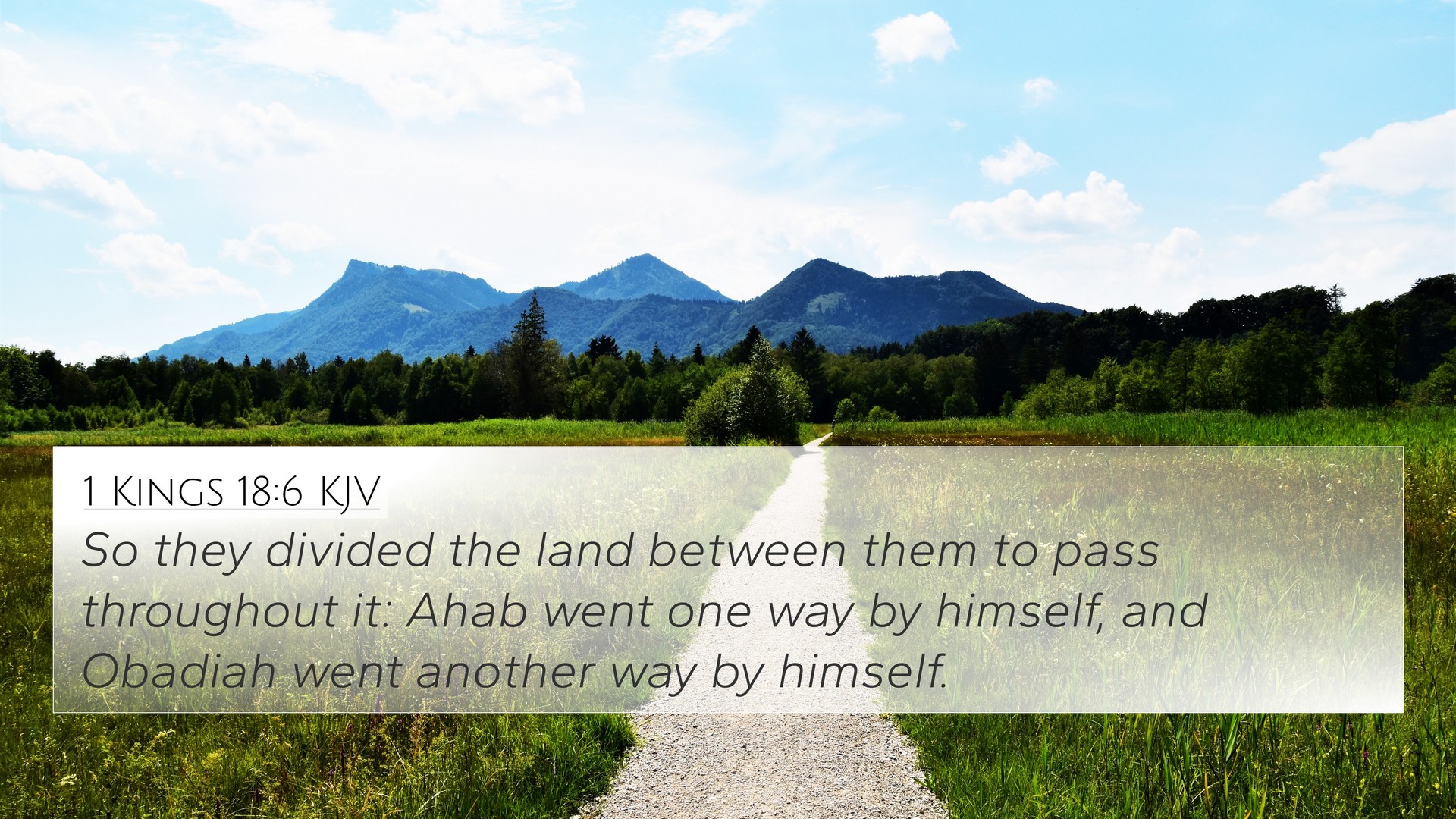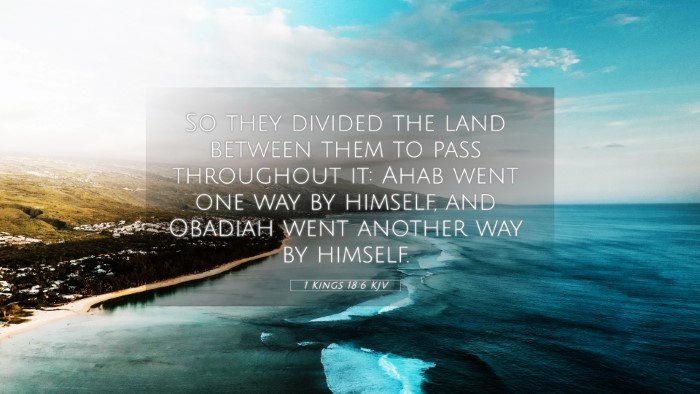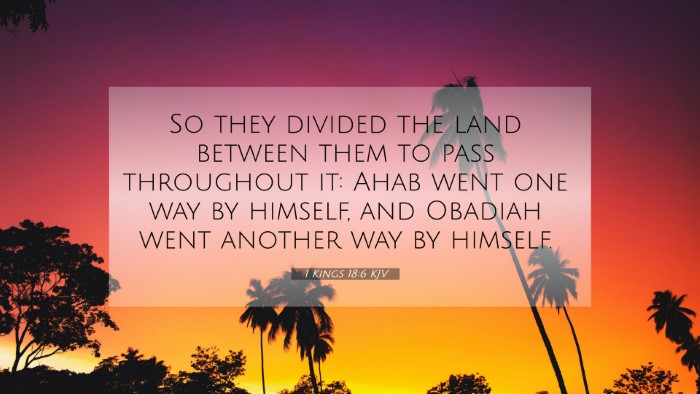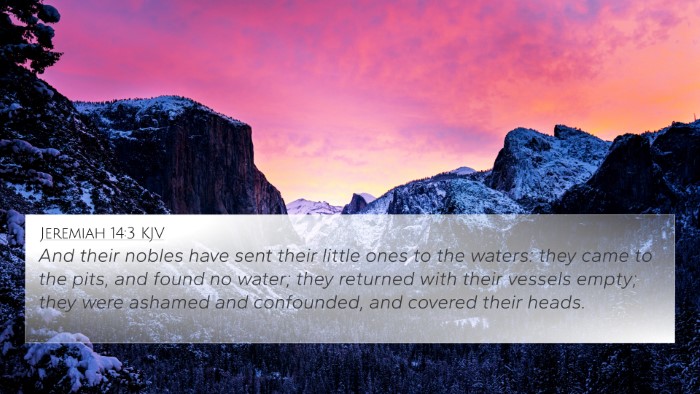Understanding 1 Kings 18:6
1 Kings 18:6 (KJV): "So they divided the land between them to pass throughout it; Ahab went one way by himself, and Obadiah went another way by himself."
This verse depicts a significant moment during the drought in Israel, where King Ahab is in search of water and pasture for his horses and mules. The act of dividing the land symbolizes the need for strategic planning and cooperation. Let's delve deeper into the meanings embedded in this verse through insights from various public domain commentaries.
Commentaries and Insights
Matthew Henry's Commentary
Matthew Henry highlights that this verse shows the urgency of Ahab’s mission—desiring to save his animals during a time of severe drought. The separation of Ahab and Obadiah reflects a divided kingdom and their respective responsibilities. Henry emphasizes the contrast between Ahab’s worldly authority and Obadiah's faithful service to God, suggesting that despite Ahab's kingship, it is Obadiah who faithfully serves God, hiding the prophets from persecution.
Albert Barnes’ Notes
According to Albert Barnes, this passage illustrates Ahab's desperation in his search for sustenance for his livestock. Barnes notes that this king, who once sought to challenge God through his idolatry, now finds himself relying on earthly solutions to a divine problem—a drought that was a direct consequence of disobedience to Yahweh. The commentary further emphasizes the role of Obadiah, who is depicted as a faithful servant of the Lord, fulfilling his obligations despite living under a corrupt regime.
Adam Clarke's Commentary
Adam Clarke offers insights into the broader implications of this division. He suggests that Ahab’s search is not just for physical resources but symbolizes a deeper quest—one for spiritual revival in a nation that had turned away from God. Clarke points out the irony in the king’s actions; while he seeks to preserve his kingdom’s livestock, he neglects the true source of life and sustenance, pointing back to God’s authority over the land.
Bible Verse Cross-References
This verse has several connections within the Biblical text that enhance our understanding of its context and implications:
- James 5:17 - "Elias was a man subject to like passions as we are, and he prayed earnestly that it might not rain: and it rained not on the earth by the space of three years and six months." (This connects to the drought mentioned in 1 Kings 18.)
- 1 Kings 17:1 - "And Elijah the Tishbite, who was of the inhabitants of Gilead, said unto Ahab, As the Lord God of Israel liveth, before whom I stand, there shall not be dew nor rain these years, but according to my word." (The prophecy of drought initiated by Elijah.)
- 1 Kings 18:5 - "And Ahab said unto Obadiah, Go into the land, unto all fountains of water, and unto all brooks: peradventure we may find grass to save the horses and mules alive." (Providing context for Ahab's search for grass and water.)
- 1 Samuel 25:10 - The relationship dynamics of power and respect observed in Ahab and Obadiah can be compared to times of conflict as seen in other major figures of Israel's history.
- Matthew 6:26 - "Behold the fowls of the air: for they sow not, neither do they reap, nor gather into barns; yet your heavenly Father feedeth them. Are ye not much better than they?" (Illustrates God's providential care, which Ahab overlooks.)
- Isaiah 40:30-31 - "Even the youths shall faint and be weary, and the young men shall utterly fall: But they that wait upon the Lord shall renew their strength; they shall mount up with wings as eagles..." (A contrast to Ahab's reliance on earthly resources.)
- Proverbs 21:1 - "The king’s heart is in the hand of the Lord, as the rivers of water: he turneth it whithersoever he will." (Indicates God's ultimate control over even the highest authorities.)
- Psalms 37:25 - "I have been young, and now am old; yet have I not seen the righteous forsaken, nor his seed begging bread." (A reminder of God’s provision for His faithful servants.)
- Luke 12:24 - "Consider the ravens: for they neither sow nor reap; which neither have storehouse nor barn; and God feedeth them: how much more are ye better than the fowls?" (Similar theme of God’s provision.)
- Matthew 10:29 - "Are not two sparrows sold for a farthing? and one of them shall not fall on the ground without your Father." (Reinforcing God's concern over His creation.)
Thematic Bible Verse Connections
The themes present in 1 Kings 18:6 reveal significant connections across the Scriptures regarding faithfulness, divine provision, and kingship. Here are some thematic observations:
- The Relationship Between Kingship and Faithfulness: While Ahab exemplifies a ruler seeking solutions through his might, Obadiah’s hidden faithfulness amidst the crisis serves to contrast the true attributes of God’s servants in times of trial.
- Divine Providence vs. Human Efforts: Ahab’s actions reflect a common human tendency to rely solely on our own capabilities rather than seeking God’s intervention, a theme echoed throughout the Scriptures.
- Spiritual Drought: Beyond the physical drought, this verse is symbolic of spiritual barrenness versus the wellspring of life found in obedience to God, which leads us to compare it with Jesus’ statement about living water in John 4:14.
- Obadiah’s Courageous Faith: Obadiah's role in the larger narrative of Elijah's ministry illustrates the theme of courage in faith and the importance of standing firm in one's beliefs, even when faced with significant opposition.
Conclusion
1 Kings 18:6 is a multifaceted verse that encapsulates the plight of Israel during a time of spiritual and physical drought. Through a careful examination of related commentaries and cross-references, one can glean profound insights into the nature of faith, God's providence, and the contrast between earthly leadership and divine authority. The thematic connections drawn from this verse illustrate the ongoing dialogue between various Biblical texts, enriching the reader’s understanding of the Scriptures.
This verse not only represents a historical moment but also serves as a profound reminder of God's sovereignty over all creation, encouraging us to seek Him above our own understanding and provision. As one engages in Bible cross-reference study, we can uncover the rich tapestry of scripture, revealing how interconnected the teachings of the Bible truly are.



